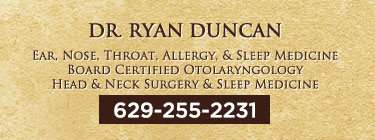Searching for Sleep Apnea Doctors in Nashville?
Dr. Ryan Duncan of ENT Specialists of Cool Springs is a Nashville Sleep Specialist who is board certified in sleep medicine. Dr. Duncan also performs sleep studies and sleep surgery for patients in Nashville, Franklin, and Middle Tennessee.
Definition of Sleep Apnea
Sleep apnea is a potentially serious sleep disorder in which breathing repeatedly stops and starts. You may have sleep apnea if you snore loudly and you feel tired even after a full night's sleep. Sleep apnea occurs in two main types:
- Obstructive sleep apnea, the more common form that occurs when throat muscles relax
- Central sleep apnea, which occurs when your brain doesn't send proper signals to the muscles that control breathing
Additionally, some people have complex sleep apnea, which is a combination of both. If you think you might have sleep apnea, see your doctor. Treatment is necessary to avoid heart problems and other complications.
Symptoms of Sleep Apnea
The signs and symptoms of obstructive and central sleep apneas overlap, sometimes making the type of sleep apnea more difficult to determine. The most common signs and symptoms of obstructive and central sleep apneas include:
- Excessive daytime sleepiness (hypersomnia)
- Loud snoring, which is usually more prominent in obstructive sleep apnea
- Observed episodes of breathing cessation during sleep
- Abrupt awakenings accompanied by shortness of breath, which more likely indicates central sleep apnea
- Awakening with a dry mouth or sore throat
- Morning headache
- Difficulty staying asleep (insomnia)
When To See A Physician
If you are experiencing (or your spouse observes) any of the following then it is a good idea to contact ENT of Cool Springs to schedule a consultation.
- Snoring loud enough to disturb the sleep of others or yourself
- Shortness of breath that awakens you from sleep
- Intermittent pauses in your breathing during sleep
- Excessive daytime drowsiness, which may cause you to fall asleep while you're working, watching television or even driving
Many people don't think of snoring as a sign of something potentially serious, and not everyone who has sleep apnea snores. But be sure to talk to your doctor if you experience loud snoring, especially snoring that's punctuated by periods of silence. Ask your doctor about any sleep problem that leaves you chronically fatigued, sleepy and irritable. Excessive daytime drowsiness (hypersomnia) may be due to other disorders, such as narcolepsy.
Causes of Obstructive Sleep Apnea
Obstructive sleep apnea occurs when the muscles in the back of your throat relax. These muscles support the soft palate, the triangular piece of tissue hanging from the soft palate (uvula), the tonsils and the tongue.
When the muscles relax, your airway narrows or closes as you breathe in, and breathing momentarily stops. This may lower the level of oxygen in your blood. Your brain senses this inability to breathe and briefly rouses you from sleep so you can reopen your airway.
This awakening is usually so brief that you don't remember it. You can awaken with a transient shortness of breath that corrects itself quickly, within one or two deep breaths, although this is rare. You may make a snorting, choking or gasping sound.
This pattern can repeat itself five to 30 times or more each hour, all night long. These disruptions impair your ability to reach the desired deep, restful phases of sleep, and you'll probably feel sleepy during your waking hours. People with obstructive sleep apnea may no




